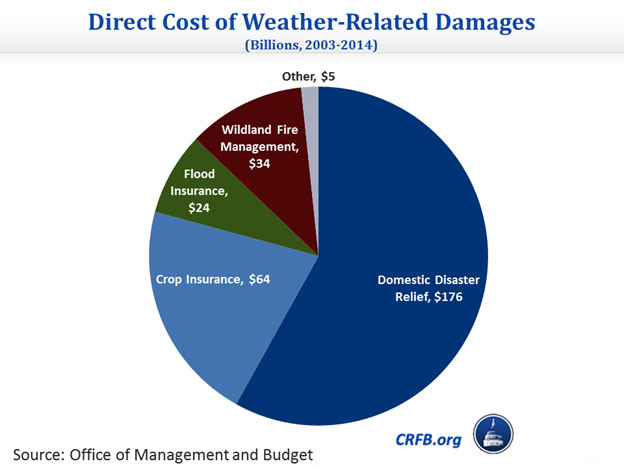CBO Forecasts Costs of Climate Change
The Congressional Budget Office (CBO) has released new estimates of the cost of climate change, specifically as it relates to hurricanes. The report forecasts hurricane damage in 2075 to cost an expected $156 billion in today's dollars, more than five times larger than costs under current climate conditions. Hurricane damage in 2075 is forecasted to cost between $104 billion and $226 billion annually, four to eight times larger than under current conditions.
The increased costs that CBO projects reflect two factors, which are captured in two different scenarios:
- Rising sea levels and increased hurricane frequency and intensity as a result of climate change.
- Greater coastal development, which increases the value of property at risk from hurricanes.
| Expected Annual Cost of Hurricane Damage (Billions, 2015 Dollars) | ||
| 2025 | 2075 | |
| Under current conditions (baseline) | $29 | $29 |
| Scenario with climate change only | $32 | $60 |
| Scenario with climate change and increased coastal development | $37 | $156 |
Source: CBO
While the increase in expected costs by 2075 is less than 0.1 percent of Gross Domestic Product (GDP), hurricanes are just one possible source of increased damage as a result of climate change, and these cost increases would accumulate over time. We’ve written previously about the potential costs associated with climate change and how these can feed through to the federal budget.

In related news, the White House has recently expressed concern about climate-related issues in the Energy and Water Appropriations bill set to be considered in the Senate.
The White House Office of Management and Budget's (OMB) main objections to the bill include low funding levels for renewable energy projects ($790 million lower than the President’s budget), grid modernization and other investments in the resilience of the electricity and energy system ($118 million lower) and energy-related advanced research projects ($291 million lower). OMB also criticizes the bill for undermining the ability of federal agencies to protect federal investments from flood risk.
Readers can track developments in the appropriations process with our Appropriations Watch.

